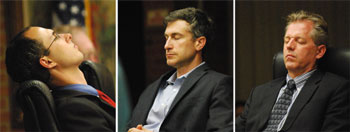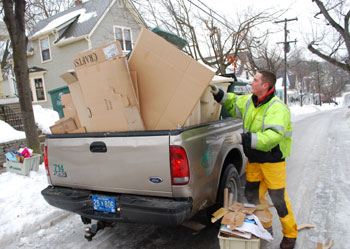Details on FY 2014 Budget Debate
Ann Arbor city council meeting Part 1: Budget debate (May 20, 2013): The council’s meeting did not conclude until nearly 2 a.m. after a 7 p.m. scheduled start. This portion of The Chronicle’s meeting report focuses mostly on the council’s fiscal year 2014 budget deliberations, which started at about 9 p.m. and ended around 1:30 a.m.

From left: Chuck Warpehoski (Ward 5), Christopher Taylor (Ward 3) and Stephen Kunselman (Ward 3). Budget deliberations pushed the meeting until nearly 2 a.m.
The council considered several amendments to the FY 2014 budget. But the total impact on the general fund of all the successful amendments was not significant, leaving mostly intact the “status quo” budget that had been proposed by city administrator Steve Powers a month earlier. That was a budget with $82.9 million in general fund expenditures. [.pdf of one-page summary of possible amendments] [.pdf of longer detail on FY 2014 budget amendments]
Most of the successful amendments were voted through with relatively little debate, and involved amounts of $100,000 or less. For example, the Washtenaw Health Initiative received an additional $10,000 allocation, and the Miller Manor senior meals program received a $4,500 boost. Allocations to human services nonprofits were increased by $46,899. And the general fund balance was tapped to conduct a $75,000 study of sidewalk gaps so that projects could be prioritized.
The affordable housing trust fund received an infusion of $100,000 from the general fund reserve. The council also approved an amendment prohibiting the spending of $326,464 that was set aside in the FY 2014 budget for public art, in anticipation of a final affirmative vote on a change to the public art ordinance. A vote on amending that ordinance is likely to take place on June 3, before the fiscal year begins on July 1.
The “parks fairness” amendment, which came after deliberations on all other amendments, was a straightforward calculation in accordance with a city policy. The policy requires that any increase in general fund spending be matched by a parallel increase for parks. The council approved that $22,977 amendment with scant remark.
Just three issues took about 80% of the council’s roughly 4.5-hour budget deliberations: (1) the budget of the Ann Arbor Downtown Development Authority, (2) the possible reduction of the 15th District Court budget in order to pay for three additional police officers, and (3) the proposed restoration of loose leaf collection in the fall.
Of the most time-consuming items, the change to the DDA’s budget was ultimately approved – after escalating political rhetoric led to a kind of compromise that had almost unanimous support. The DDA compromise budget amendment called for a $300,000 transfer from the DDA’s TIF (tax increment finance) fund to the DDA’s housing fund, and a recommendation to spend $300,000 of TIF money on the replacement of Main Street light poles. Only Christopher Taylor (Ward 3) dissented.
The lone dissenting vote on the budget as a whole was Jane Lumm (Ward 2), who issued a verbal spanking of her colleagues and the city administrator – for proposing and approving a budget she did not feel reflected a priority on public safety. Countering Lumm was Taylor, who pointed out that roughly half of the general fund expenditures are related to public safety. [Full Story]




